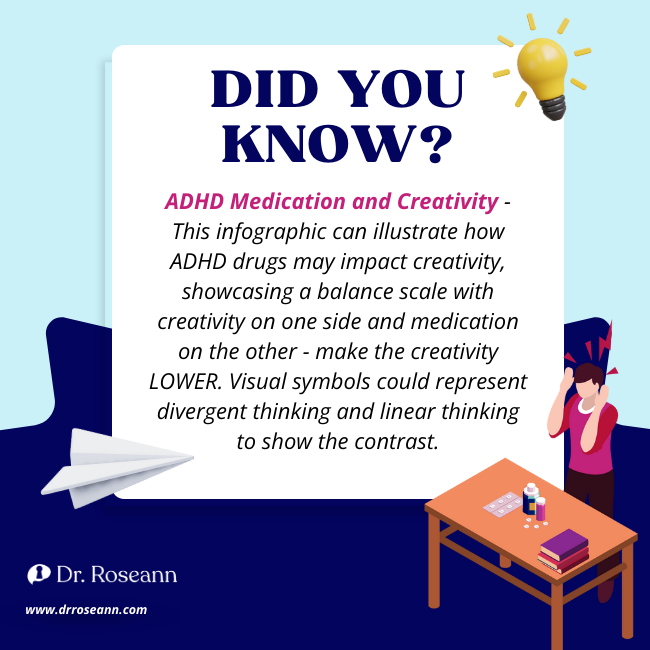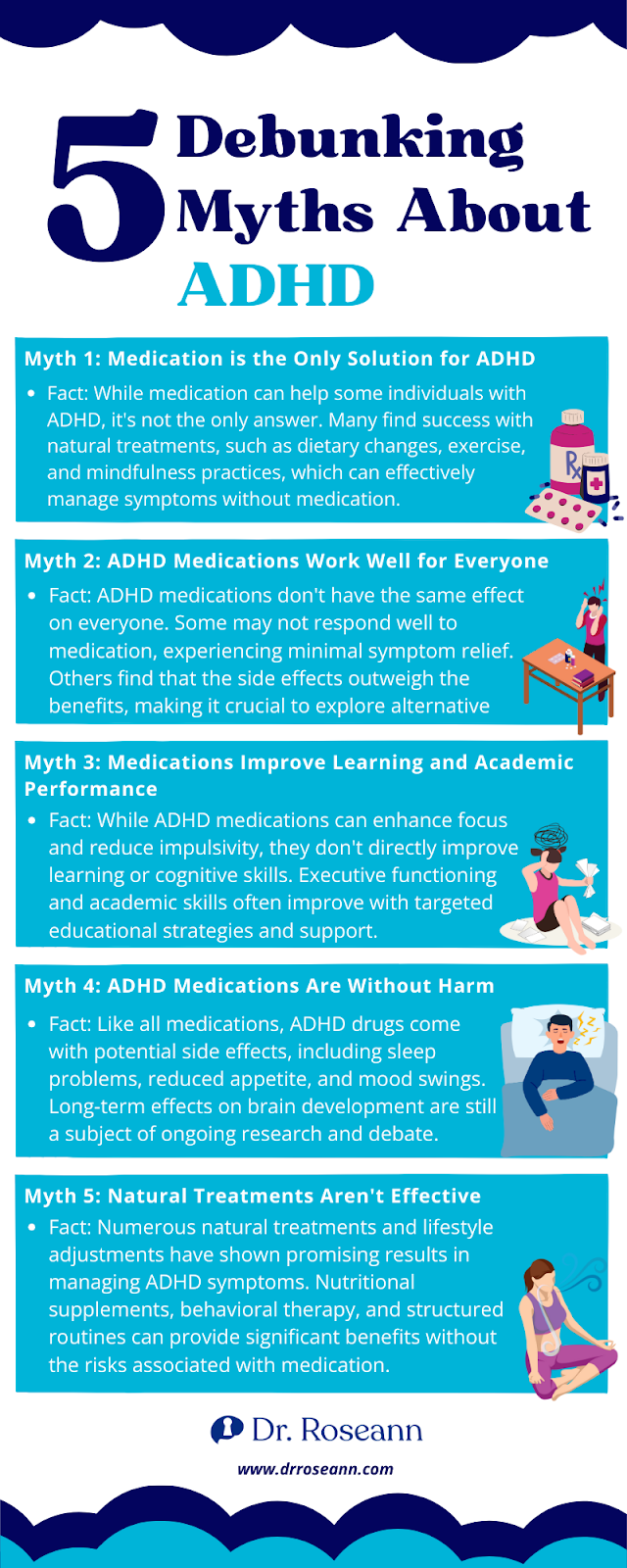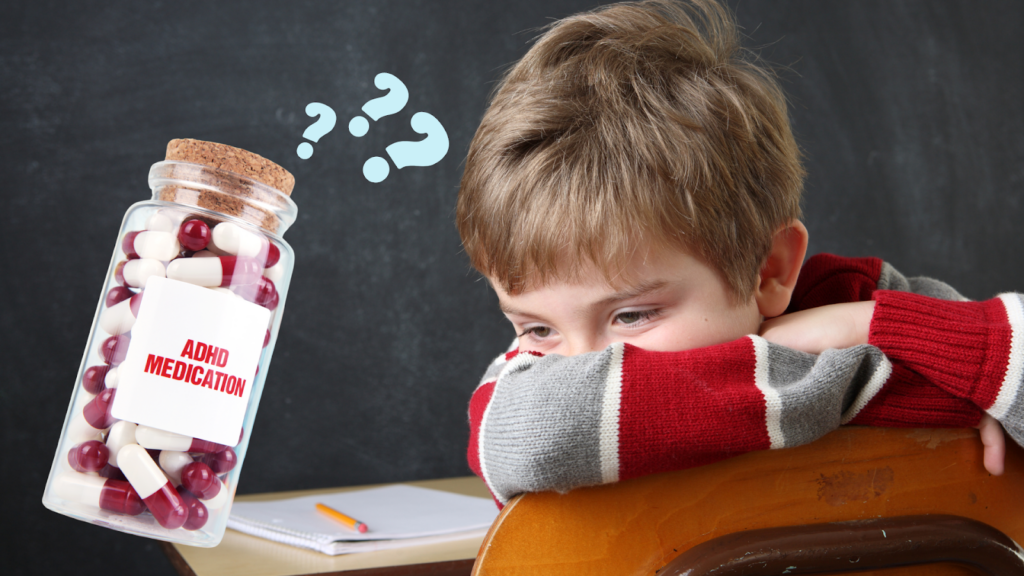While it may seem that medication can significantly aid in managing ADHD symptoms, it's crucial to understand potential drawbacks or side effects. Most of my patients try medication because it is the only option presented and by the time they get to me in my clinic, they recognize that it isn’t really helping behavior.
When it comes to medications, there are stimulant and non-stimulant options. They are purported to improve focus and attention and reduce impulsivity. Many believe it will help executive functioning but those are a set of learned skills that can improve with direct instruction.
While ADHD medications are often pushed by physicians, therapists and teachers, I have increasingly seen that parents are becoming more savvy and are investigating before giving their child or teen drugs that can possibly harm the brain.
Recently Kim and Derek brought their teen, Annabelle, to me after years of trying ADHD medication after medication. They felt like they were on a rollercoaster of side effects and decided to get off. After a QEEG brain map, her brain profile was consistent with ADHD, Inattentive Type with anxiety. That led the family to finally get the right help for Annabelle.
What are the Most Common ADHD Drugs?
Adderall and Ritalin are among the most commonly prescribed drugs for ADHD. They work by increasing neurotransmitters like dopamine and norepinephrine levels in the brain, which is supposed to improve attention and focus.
Non-stimulant medications like Strattera target different neurotransmitters, offering an alternative for those who may not tolerate stimulants well or prefer a non-stimulant approach.
Exploring the Downsides of ADHD Drugs
While ADHD medications can be effective, they also come with potential downsides that warrant consideration. Some individuals may experience side effects such as irritability, mood swings, and reduced appetite, impacting their daily lives and overall well-being.
Additionally, there are concerns about the long-term effects of stimulant medications on brain development and function, particularly in children and adolescents. ADHD medications can:
1. Flatten Creativity

One common concern regarding ADHD medication is its potential to flatten creativity. Creativity is thinking divergently, generating novel ideas, and approaching problems from unconventional angles.
Some people report feeling that ADHD medication dampens their creative impulses, leading to a more linear style of thinking and reduced spontaneity. While this is only sometimes experienced, it's a significant consideration for those who rely on their creativity for various aspects of their lives, such as artistic endeavors or problem-solving in unconventional domains.
2. Increased Irritability and Crankiness
Another downside associated with ADHD medication is the possibility of increased irritability and crankiness. Stimulant medications, commonly prescribed for ADHD, can affect mood regulation in some children and teens, leading to periods of heightened irritability or mood swings.
This can impact interpersonal relationships and overall quality of life, as navigating intense emotional states can be challenging for individuals and those around them. Managing these fluctuations in mood requires careful monitoring and, in some cases, adjustments to medication dosage or alternative treatment approaches.
3. Enhanced Emotionality
In addition to increased irritability, ADHD medication may also amplify emotional responses, leading to heightened emotionality. While some individuals may find this aspect beneficial, as it can facilitate a more profound connection with their emotions, others may struggle to manage intense feelings of joy, sadness, or frustration.
Balancing emotional reactivity with emotional regulation becomes crucial for individuals navigating the effects of ADHD medication, as finding stability amidst fluctuating emotions is essential for overall well-being.
4. Reduced Hunger
Many ADHD medications are known to suppress appetite, causing reduced hunger and potential weight loss. While this may be advantageous for individuals struggling with weight management, it can pose challenges for those who already have difficulty maintaining a healthy appetite or adequate nutrition. Proper nutrition is vital for overall health and cognitive functioning, and the appetite-suppressing effects of ADHD medication require careful attention to ensure that nutritional needs are met.
A study on 30 people with ADHD who were taking methylphenidate compared them to 20 people without ADHD. They checked the levels of leptin, ghrelin, adiponectin, and BDNF in their bodies before and after two months of treatment.
Before treatment, the levels of these things were about the same in both groups. However, after two months of treatment, the ADHD group had some changes. Most of them had less appetite and lost weight. Their body weight and BMI decreased, and their ADHD symptoms improved.
After treatment, the ADHD group had higher levels of ghrelin and adiponectin, which might be related to why they lost weight. However, their BDNF levels were lower. Leptin levels didn't change much (Sahin et al., 2014).
5. Potential Harm to the Brain
There's ongoing debate and research regarding the long-term effects of ADHD medication on brain development and function. Some studies suggest that chronic use of stimulant medication may alter brain structure and function. Concerns about potential harm to the developing brain, particularly in children and adolescents, highlight the importance of cautious prescribing practices and close monitoring by healthcare professionals (Ersche et al., 2013).

Balancing Benefits and Risks of Common ADHD Medications
I always emphasize the importance of striking a balance between the benefits and risks of ADHD medication. Drawing on my extensive clinical experience, I work closely with children and their parents to shift to therapy and natural solutions to ADHD treatment. Through open communication and personalized care, it’s possible to navigate the complexities of ADHD and empower children to achieve optimal outcomes and improve their quality of life.
ADHD medications may improve the quality of life for some children with the condition, but it's essential to recognize that these medications have drawbacks. Annabelle was able to reduce ADHD symptoms by changing her diet, increasing exercise, taking supplements and using our CALM PEMF ® device.
If you want solutions that won’t harm your child, start with the Natural ADHD Focus Formula Kit. Learn to boost your child’s attention, focus, and school performance without medication.
What are the different types of ADHD medication?
ADHD medications primarily fall into two categories: stimulants and non-stimulants. Stimulants, like Ritalin and Adderall, increase certain neurotransmitters in the brain, improving attention and focus. Non-stimulants, such as Strattera and Intuniv, work differently by targeting other neurotransmitters and are often considered when stimulants aren't effective or are not preferred.
What medicine is used for ADHD?
The most commonly prescribed medications for ADHD include stimulants like methylphenidate (e.g., Ritalin, Concerta) and amphetamines (e.g., Adderall, Vyvanse), as well as non-stimulant options like atomoxetine (Strattera) and guanfacine (Intuniv).
Is Focalin more powerful than Adderall?
Focalin (dexmethylphenidate) and Adderall (amphetamine/dextroamphetamine) are both stimulant medications used to treat ADHD. They may affect individuals differently, so what works best can vary. There isn't a straightforward answer regarding which one is more powerful, as efficacy can depend on individual responses and factors such as dosage and tolerance.
Is Concerta stronger than Adderall?
Concerta (methylphenidate) and Adderall (amphetamine/dextroamphetamine) are both effective medications for ADHD, but they work differently. There isn't a straightforward answer to whether Concerta is “stronger” than Adderall, as effectiveness can vary from person to person. It's best to consult a healthcare professional to determine which medication suits an individual's needs.
Is Adderall stronger than Ritalin?
Comparing the strength of Adderall (amphetamine/dextroamphetamine) and Ritalin (methylphenidate) is complex as they have different chemical compositions and mechanisms of action. Both medications are effective for ADHD but may have different effects on individuals. The perceived strength can vary based on factors such as dosage, individual response, and specific symptoms being targeted. It's essential to consult a healthcare professional to determine which medication suits an individual's needs.
How does ADHD medication work?
ADHD medications, such as stimulants like Adderall and non-stimulants like Strattera, work by affecting neurotransmitters in the brain, particularly dopamine and norepinephrine. These medications help improve attention, focus, and impulse control by increasing the levels of these neurotransmitters in specific areas of the brain associated with ADHD symptoms.
What do doctors prescribe for ADD?
Doctors may prescribe various medications for Attention Deficit Disorder (ADD), including stimulants like methylphenidate (e.g., Ritalin, Concerta) and amphetamines (e.g., Adderall, Vyvanse), as well as non-stimulant options like atomoxetine (Strattera) and guanfacine (Intuniv). The choice of medication depends on factors such as the individual's age, medical history, and specific symptoms.
Citations
Ersche, K. D., Williams, G. B., Robbins, T. W., & Bullmore, E. T. (2013). Meta-analysis of structural brain abnormalities associated with stimulant drug dependence and neuroimaging of addiction vulnerability and resilience. Current Opinion in Neurobiology, 23(4), 615–624. https://doi.org/10.1016/j.conb.2013.02.017
Sahin, S., Yuce, M., Alacam, H., Karabekiroglu, K., Say, G. N., & Salıs, O. (2014). Effect of methylphenidate treatment on appetite and levels of leptin, ghrelin, adiponectin, and brain-derived neurotrophic factor in children and adolescents with attention deficit and hyperactivity disorder. International Journal of Psychiatry in Clinical Practice, 18(4), 280–287. https://doi.org/10.3109/13651501.2014.940054
Dr. Roseann is a mental health expert in ADHD who is frequently in the media:
- Helping Children Thrive Podcast Benefits of Neurofeedback for children with ADHD
- She Knows 11 Products Moms of Kids With ADHD Swear By to Maintain Order in the Chaos
- The Healthy 12 Silent Signs of Adult ADHD You Might Be Ignoring
Always remember… “Calm Brain, Happy Family™”
Disclaimer: This article is not intended to give health advice and it is recommended to consult with a physician before beginning any new wellness regime. *The effectiveness of diagnosis and treatment vary by patient and condition. Dr. Roseann Capanna-Hodge, LLC does not guarantee certain results.
Are you looking for SOLUTIONS for your struggling child or teen?
Dr. Roseann and her team are all about science-backed solutions, so you are in the right place!
Is it ADHD or something else?
Take the Quiz to Find Out Why Your Kid Can’t Focus, Listen, or Complete Tasks.
Dr. Roseann is a Children’s Mental Health Expert and Licensed Therapist who has been featured in/on hundreds of media outlets including The Mel Robbins Show, CBS, NBC, PIX11 NYC, Today, FORBES, CNN, The New York Times, The Washington Post, Business Insider, Women’s Day, Healthline, CNET, Parade Magazine and PARENTS. FORBES called her, “A thought leader in children’s mental health.”

She coined the terms, “Re-entry panic syndrome” and “eco-anxiety” and is a frequent contributor to media on mental health.
Dr. Roseann Capanna-Hodge has three decades of experience in working with children, teens and their families with attention-deficit hyperactivity disorder (ADHD), autism, concussion, dyslexia and learning disability, anxiety, Obsessive Compulsive Disorder (OCD), depression and mood disorder, Lyme Disease, and PANS/PANDAS using science-backed natural mental health solutions such as supplements, magnesium, nutrition, QEEG Brain maps, neurofeedback, PEMF, psychotherapy and other non-medication approaches.
She is the author of three bestselling books, It’s Gonna Be OK!: Proven Ways to Improve Your Child's Mental Health, The Teletherapy Toolkit, and Brain Under Attack. Dr. Roseann is known for offering a message of hope through science-endorsed methods that promote a calm brain.
Her trademarked BrainBehaviorResetⓇ Program and It’s Gonna be OK!Ⓡ Podcast has been a cornerstone for thousands of parents facing mental health, behavioral or neurodevelopmental challenges.
She is the founder and director of The Global Institute of Children’s Mental Health, Neurotastic™Brain Formulas and Dr. Roseann Capanna-Hodge, LLC. Dr. Roseann is a Board Certified Neurofeedback (BCN) Practitioner, a Board Member of the Northeast Region Biofeedback Society (NRBS), Certified Integrative Mental Health Professional (CIMHP) and an Amen Clinic Certified Brain Health Coach. She is also a member of The International Lyme Disease and Associated Disease Society (ILADS), The American Psychological Association (APA), Anxiety and Depression Association of America (ADAA) National Association of School Psychologists (NASP), International OCD Foundation (IOCDF).
© Roseann-Capanna-Hodge, LLC 2024










